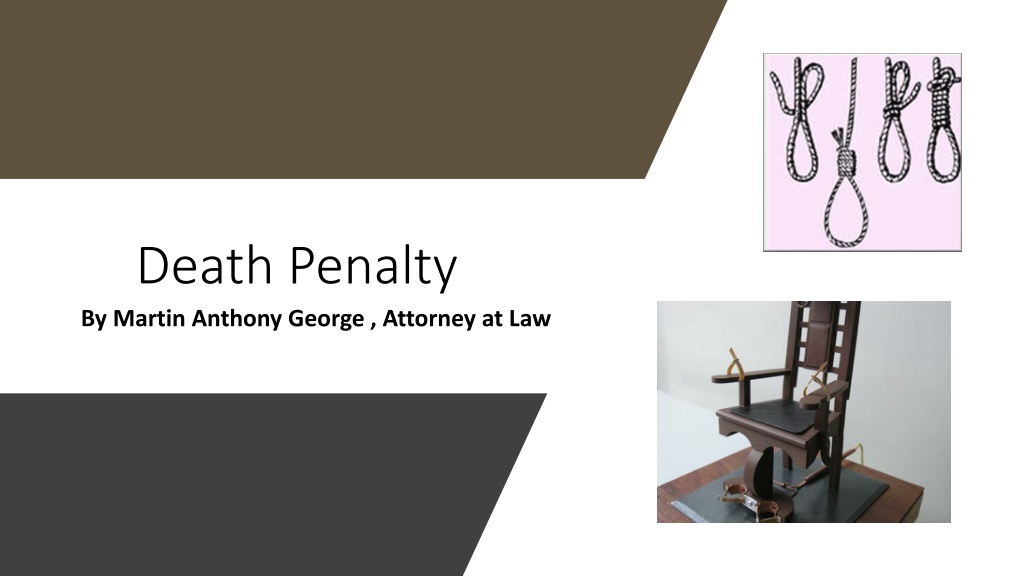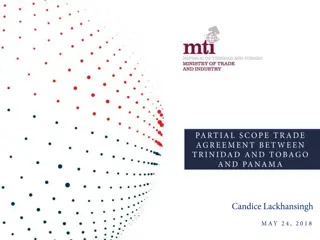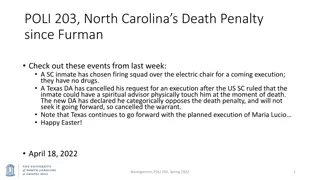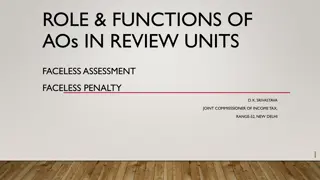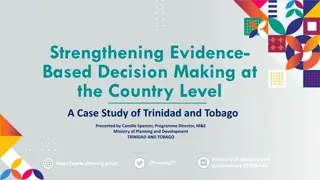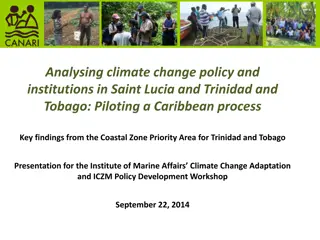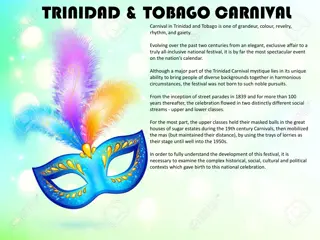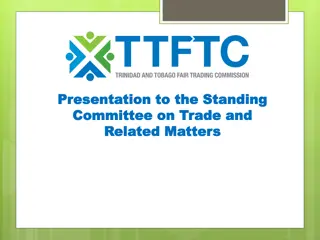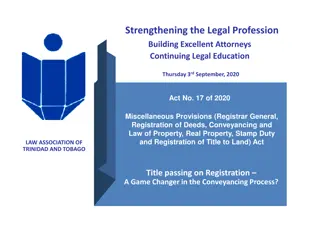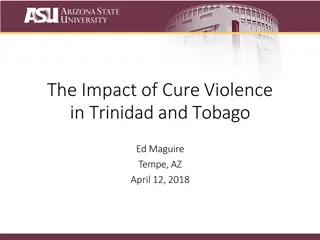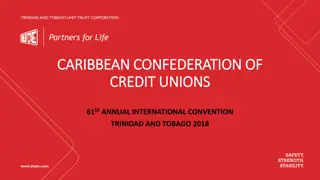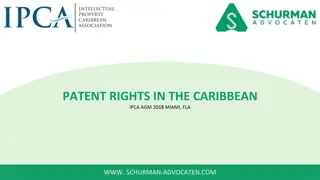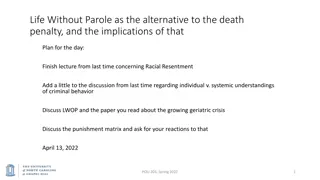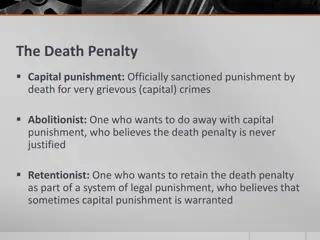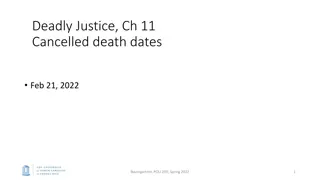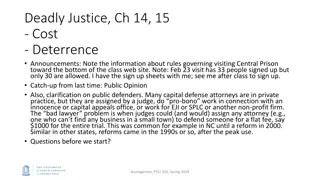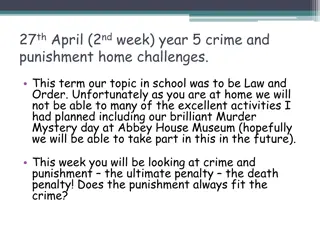The Controversial Topic of Death Penalty in Trinidad and Tobago
The death penalty in Trinidad and Tobago remains a contentious issue, with the mandatory death penalty still in place for murder convictions. Despite rulings on its constitutionality, executions have occurred in recent history. The role of the Privy Council, sovereignty, and past executions highlight the complex legal landscape surrounding capital punishment in the country.
Download Presentation

Please find below an Image/Link to download the presentation.
The content on the website is provided AS IS for your information and personal use only. It may not be sold, licensed, or shared on other websites without obtaining consent from the author. Download presentation by click this link. If you encounter any issues during the download, it is possible that the publisher has removed the file from their server.
E N D
Presentation Transcript
Death Penalty By Martin Anthony George , Attorney at Law
DEFINITION OF DEATH PENALTY DEFINITION According to : http://www.duhaime.org , the death penalty; Also known as capital punishment, is the most severe form of corporal punishment as it is requires law enforcement officers to kill (to cause the death of, to end the life) of the convicted offender. Forms of the death penalty include lethal injection, hanging from the neck, gassing, firing squad and has included use of the guillotine.
DEATH PENALTY AND SOVEREIGNTY Despite talk of sovereignty in discussions on the death penalty, the London- based privy council is still Trinidad and Tobago's final court of appeal. This arrangement is a throwback to the days when the country was a British colony. The judicial committee of the privy council is essentially comprised of the judges of the UK supreme court, reconstituting themselves as the privy council. Though UK judges ordinarily work in a domestic system that has long abolished the death penalty, they have shown remarkable restraint and fidelity to the laws of Caribbean countries. Trinidad and Tobago's engagement of the privy council persists, even as the Caribbean court of justice (CCJ) intended as a final court of appeal for Caricom member countries is situated in its capital, Port of Spain. Yet neither it nor Jamaica sends cases to the CCJ, as their final appellate court.
Death Penalty in Trinidad and Tobago Trinidad and Tobago is one of only a very few countries worldwide which still retains the mandatory death penalty for persons convicted of murder. The mandatory death penalty is provided for in Section 4 of the Offences Against the Person Act 1925 which states that Every person convicted of murder shall suffer death. On independence in 1962, the mandatory death penalty for murder remained law. Although the Privy Council has ruled that the mandatory death penalty for murder is unconstitutional, in Trinidad and Tobago the penalty is protected by a savings clause at section 6 of the Constitution which states that: Nothing in sections 4 or 5 [Recognition and Protection of Fundamental Human Rights and Freedoms] shall invalidate an existing law. Trinidad , Year of Last Known Execution -1999. In 1999, 10 people were hanged in Port of Spain within a 6 week period in June and July. The previous execution had taken place in 1994.
Former Attorney General Former Attorney General Trinidad and Tobago Ramesh Lawrence Maharaj s view on the death Ramesh Lawrence Maharaj s view on the death penalty penalty Trinidad and Tobago - - In 1999, the last time this country hanged a convicted killer the murder toll for the year was 93. That was the lowest this country's murder toll has been for at least the last 23 years, according to statistics. At the current rate of murders taking place in this country, we will reach that 1999 toll by February just two months into the new year. With only 28 days of this year gone so far, the murder toll in this country has already surpassed the 1999 halfway mark with more than 50 people being killed in just 29 days. "After we carried out the death penalty things in Trinidad and Tobago were calm everywhere, very calm, because it makes a difference to the psychology of a criminal if the person knows that if he is caught he will be convicted and if he is convicted, he will face the death sentence. If the criminals and the potential criminals know that they will get away, they would not be caught or if they are a caught they will still get away, you are not solving crime, you can't solve it," Senior Counsel Ramesh Lawrence Maharaj told the Sunday Guardian. Maharaj was the attorney general when the last hangings in Trinidad and Tobago took place. Anthony Briggs was the last person to be hanged. Briggs bludgeoned taxi driver Siewdath Ramkissoon to death during a robbery in August 1992. On June 21, 1996, Briggs was convicted of murder. He was executed on July 28, 1999. Briggs was hanged just over a month after the notorious Dole Chadee gang was hanged over a three-day period. Dole Chadee, Joey Ramiah and Ramkelawan Singh were executed on June 4, 1999.While Clive Thomas, Robin Gopaul and Russell Sankeralli were hanged on June 5, 1999. On June 7, 1999 Joel Ramsingh, Steve Eversley and Bagwandeen Singh were hanged. The Chadee gang were hanged for their involvement in the murder of the Baboolal family in 1994. Hamilton Baboolal, his mother Rookmin, his sister, Monica, and his father, Deo, were all shot dead during the incident.
Former Attorney General Former Attorney General Trinidad and Tobago Ramesh Lawrence Maharaj s view on the death Ramesh Lawrence Maharaj s view on the death penalty penalty Trinidad and Tobago - - "I think one of the reasons for the high murder rate in Trinidad and Tobago and the high crime rate is that the State apparatus for fighting crime has failed and it leads one to wonder whether there is any serious mission to deal with the crime problem," he said. 'We need action, passion, determination' "In order to carry out the death penalty you first have to catch the murderer, if you do not catch the murderer you cannot hang phantom people, so in order to catch the murderer you have to improve the detection machinery and you cannot improve the detection machinery to catch the criminals if you do not have a proper forensic laboratory. And we do not have a proper forensic laboratory in Trinidad and Tobago, we do not have the modern technology, and we do not use the modern technology," he said. Maharaj said the country also does not have an effective Witness Protection Programme in the country. He said a DNA bank also needs to be established. "Here is it in Trinidad and Tobago we are dealing with a crime problem in the 21st century but we really have 18th century methods to deal with it," Maharaj said. if something is not done the crime problem will get worse, Maharaj warned. "Trinidad and Tobago has to make a decision and it is a serious decision. This crime problem is going to get more uncontrollable unless serious and genuine steps are taken immediately to arrest the crime problem. We have to stop using the excuse of we need legislation and law to fight this problem, we do not need more laws, we need action, we need passion, we need determination," he said. Maharaj said evidence of nothing being done in this country is that he brought a law in 2000 putting murder into three categories so that the death penalty would be restricted to certain crimes. "In 2000 I went to the Parliament, the Senate passed a law, the House of Representatives passed a law, it was only to be proclaimed in which murder would be categorised into three categories so you restrict the death penalty. Up to today, it is not implemented," he said. The law brought by Maharaj is Act No 90 of 2000 and is called An Act to amend the Offences Against The Person (Amendment) Act, 2000.
Former Attorney General Former Attorney General Trinidad and Tobago Ramesh Lawrence Maharaj s view on the death Ramesh Lawrence Maharaj s view on the death penalty penalty Maharaj: Al-Rawi on right foot ; With fresh attempts now being made to resume hangings, Maharaj said AG Al-Rawi s actions are similar to the measures he took to resume hangings back in 1999. I set up a case management unit which monitored on a regular basis the passage of murder cases and with the co- operation of the Chief Justice had matters expedited. We were able to meet the deadline and have executions done, including that of Dole Chadee and his gang, Maharaj told the T&T Guardian. Within six months of initiating this measure, hangings resumed in T&T, beginning with Chadee and his accomplices. Maharaj said Al-Rawi has taken a step in the right direction. Recalling that he had fought against the death penalty for many years, he admitted: When I became attorney general I saw the law from the other side. Maharaj said if the tracking unit is properly managed, improvements are made to the police s investigating machinery and a DNA bank initiated, the death penalty can be implemented in six to nine months. However, he suggested that Al-Rawi monitor operations and ensure that any obstacles are removed. While Maharaj agrees that death sentences should be handed down to individuals found guilty of brutal murders, he strongly believes the law should be amended to protect innocent people from being executed. Maharaj, who introduced the DNA Act in 2001, said he was amazed that 14 years later a DNA bank has not been established to match evidence in murder cases. Also the Forensic Sciences Centre still needs overhauling. I passed all the necessary laws and after that nothing happened. The past governments just kept amending the law. I don t know what is going on. Right now all the police have as evidence are witnesses . . . and you cannot have that if you do not have an effective witness protection programme, he said. Trinidad and Tobago - -
Judge Herbert Judge Herbert Volney s penalty penalty Volney s view on the death view on the death A differing view on the death penalty was offered by former high court judge Herbert Volney who said T&T should follow other countries that have abolished the death penalty. It s a progressive thing to happen. I have passed the death penalty in excess of sixty times in my life and only one of those persons were hanged, that was Joey Ramiah. I don t think Ramiah was hanged for the matter which I handed down. Volney said the death penalty was proven not to be a deterrent after the hangings of Chadee and his gang. Death penalty targets the marginalised
Death penalty debate in the Caribbean Death penalty debate in the Caribbean Shaliza Hassanali Sunday, December 20, 2015 The Caribbean Regional Conference on Abolition of the Death Penalty held in November 2017 in Guyana attended by Derek Lambe, head of Political, Press and Information, Fernando Ponz, deputy head of Division for the Caribbean, European External Action Service; Dr Rajiv Narayan, senior policy advisor, International Commission Against the Death Penalty, Dr Asunta Viv Cavaller, secretary-general, International Commission Against the Death Penalty; Lord Navnit Dholakia, UK All Party Parliamentary Group for the Abolition of the Death Penalty; and ambassador Jernej Videti , EU Delegation Guyana. Photo courtesy the European Union Maharaj was attorney general the last time the death penalty was carried out in T&T 16 years ago. His views on the matter were sought in the context of Al-Rawi s latest moves to re-introduce hangings, as well as renewed debate on the matter at regional level. This follows the recent Caribbean Regional Conference on Abolition of the Death Penalty hosted by the European Union (EU) in conjunction with the British High Commission at the Arthur Chung Conference Centre in Georgetown, Guyana. The conference attracted abolitionist groups from Europe and the Caribbean for discussions that focused on three key issues the death penalty in the Caribbean, whether it works as a deterrent and the experiences of other countries in abolishing the death penalty. If Attorney General Faris Al-Rawi plays his cards right, the death penalty could resume in T&T in six to nine months time . That is the time frame former attorney general Ramesh Lawrence Maharaj estimates Al-Rawi needs to put measures in place for enforcement. Published: http://guardian.co.tt/news/2015-12-20/death-penalty-debate-caribbean
Death penalty debate in the Caribbean Death penalty debate in the Caribbean Just weeks earlier Al-Rawi had signalled government s intention to apply the death penalty for convicted murderers and the establishment of a tracking committee to look at cases that warrant capital punishment where all appeals had been exhausted. I certainly intend to apply the death penalty which is the current law in Trinidad and Tobago, through due process. The point is making sure that due process works efficiently, Al-Rawi told reporters recently. The AG insisted that the death penalty was the law and he wondered why it had not been applied in recent years. He also hinted that institutional strengthening might be needed. Statistics on the death penalty in the region are contained in a March 2015 booklet compiled by the Greater Caribbean for Life (GCL). It shows that the last time the death penalty was carried out in T&T was in 1999 when Anthony Briggs was executed. A month earlier, drug lord Dole Chadee and eight members of his gang were hanged for killing four members of a Williamsville family. According to the GCL booklet, the last person hanged in the Caribbean was Charles La Place, of St Kitts and Nevis, who went to the gallows in 2008. T&T is among 13 Caribbean countries that retain the death penalty and it is estimated that between 59 and 80 prisoners are currently on death row in eight Caribbean countries. Guyana has between 20 and 41 death row prisoners, there are 11 in Barbados and Antigua and Barbuda and T&T each have 7 .
Death penalty debate in the Caribbean Death penalty debate in the Caribbean At the conference in Guyana , Dr Asunta Viv Cavaller, secretary general of the International Commission Against the Death Penalty (ICDP), said abolition of the death penalty requires political leadership. she said in countries such as France, Mexico, Mongolia and Philippines, governments were able to use their prerogative to grant clemency or impose a moratorium on executions. Such actions paved the way for legislative or constitutional repeal of capital punishment, she said. Cavaller said abolition does not mean that those found guilty of serious crimes are not punished in proportion to the crime. Death penalty is not the answer, though. There s always the risk of executing innocent people. It violates the right to life, it s cruel and degrading. She said the death penalty targets the marginalised, poor, minorities and members of racial, ethnic, political and religious groups and individuals who do not have access to defense lawyers. Fernando Ponz Canto, deputy head of Division for the Caribbean, European External Action Service, said in 2015 the EU spent US$50 million to assist with crime and security in the Caribbean. He said the EU would not tell Caribbean countries what to do, but encouraged an exchange of ideas and moving forward on the basis of good practices.
Death penalty debate in the Caribbean Death penalty debate in the Caribbean Lord Navnit Dholakia, of the UK All Party Parliamentary Committee on the Abolition of the Death Penalty, said many countries have realised that the death sentence has no place in a civilised society. Dholakia, who has worked extensively in the criminal justice system in the UK, added: There is no way in which a government can simply say this is the public opinion and this is what we must do. Public opinion is very fragile. It s not a set particular view. If people believe in you as a leader then you find that people s opinion moves towards you. To convince them it moves the other way around. The point I will make again and again is if you do not ensure proper leadership then you have a problem on your hands. You have to be tough and say this is what we are going to do. He said there has been substantial progress towards universal abolition of the death penalty. Revenge alone is not justice, he said, adding that justice goes beyond punishment and seeks a genuine recognition by the wrongdoers of their wrongdoing. Melinda Janki, executive director of the Justice Institute, said the death penalty is not a deterrent and up to 2011 there had been more than 1,600 murders in Barbados, the Bahamas, Guyana, T&T and Jamaica. Raphael Trotman, Guyana s Minister of Governance, weighing in on the matter, said: Whether we are prepared to agree and accept it or not, the incontrovertible and inconvenient truth is that one person s justice can be another s injustice. One person s way of justice can be entirely different from the other s. How do we decide, and who gets to decide what justice is and how it should be administered?
EUs recommendations EU s recommendations Formalise an unofficial moratorium on the death penalty in Caribbean countries that retain capital punishment Respect international and regional human rights laws and standards relating to the death penalty Have constructive dialogue with governments in the Caribbean to abolish the death penalty Strengthen justice system structures to ensure victims are supported and there is adequate legal assistance for vulnerable sections of society Advance human rights education as part of the curriculum for citizenship studies.
What happened in Grenada ? In 1983 Maurice Bishop, the socialist prime minister of Grenada, was killed during a coup, along with 10 others, following a violent split within his party. The deputy prime minister, Bernard Coard, Bishop's childhood friend turned rival, declared himself prime minister. Six days later, President Ronald Reagan ordered the invasion of Grenada, claiming that 650 American students on the island were at risk. According to US figures, 45 Grenadians, 24 Cubans and 19 Americans were killed in the invasion. Coard was among 14 convicted of the murders and sentenced to death. But the death penalty was commuted to imprisonment for natural life. British law lords ruled that the death sentences originally imposed on Coard and the 12 others convicted in connection with the killings were unconstitutional, in turn invalidating the process by which those sentences were later commuted to life imprisonment by the Grenadian authorities. Justice Francis Belle sentenced Bishop s deputy Bernard Coard to 40 years hard labour.
Top 10 Pro & Con Arguments Top 10 Pro & Con Arguments Should the death penalty be allowed? Should the death penalty be allowed? https://deathpenalty.procon.org The Pros and Cons under the following sub headings Morality Constitutionality Deterrence Retribution Irrevocable Mistakes Cost of Death vs. Life in Prison Race Closure for Victims' Families Attorney Quality Physicians at Execution
Alternatives to the Mandatory Death Penalty: Alternatives to the Mandatory Death Penalty: Examples from Caribbean Countries Examples from Caribbean Countries Jamaica, Belize, Saint Lucia, and Saint Kitts and Nevis have all abolished the mandatory death penalty for murder. In these countries, alternative sentences for those convicted of murder have therefore been adopted. An overview of the status of the death rows in these countries demonstrates the much reduced use of the death sentence as a sentence for murder. Amnesty International (2016) reported that in 2015, in Jamaica and in Belize, there were no prisoners on death row for the first time. The death sentences of the last condemned prisoners had been commuted through the year. Meanwhile, in Saint Lucia there were also no prisoners on death row. Although no new death sentences were imposed in Saint Kitts and Nevis, one man remained under sentence of death at the end of 2015. In Jamaica the Privy Council struck down the mandatory death penalty in 2004 in the case of Lambert Watson v The Queen ([2005] 1 AC 400). The mandatory death penalty had existed for the most serious types of murder only. Jamaica has since enacted legislation (the amended Offences Against the Person Act), which allows the death penalty as a sentence for aggravated murders, and in all other cases imposes a life sentence of varying minimum degrees of duration, either 10, 15 or 20 years, depending on the circumstances of the crime.
Alternatives to the Mandatory Death Penalty: Alternatives to the Mandatory Death Penalty: Examples from Caribbean Countries Examples from Caribbean Countries In Belize, Saint Lucia, and Saint Kitts and Nevis, the mandatory death penalty was struck down in the cases of Reyes v The Queen ([2002] 2 AC 235), The Queen v Hughes ([2002] 2 AC 259) and Fox v The Queen ([2002] 2 AC 284). In Belize, the Privy Council struck down the mandatory death penalty for Class A murder. Although the Criminal Code has not since been updated, Death Penalty Worldwide reference Pipersburgh v The Queen ([2007] UKPC 11), in which mitigating factors were presented at the sentencing stage following conviction for a Class A murder. From Belize also, a case is currently pending before the Caribbean Court of Justice, Gregory August v The Queen, which will examine whether the life imprisonment without possibility of parole of Gregory August is constitutional. a case reported post-Reyes,
Alternatives to the Mandatory Death Penalty: Alternatives to the Mandatory Death Penalty: Examples from Caribbean Countries Examples from Caribbean Countries In Saint Lucia, the revised Criminal Code holds at section 86 that A person convicted of capital murder may on conviction on indictment, be sentenced to death . However, this section also states: Notwithstanding [this section] a person convicted of capital murder shall be given an opportunity by the Court to plead in mitigation of sentence , and the Court shall take into account the gravity and nature of the offences, the character and record of the offender, subjective factors which may have influenced offender s conduct, how the offence was designed and executed, and the possibility for reform. Under section 87, an offender guilty of non-capital murder is generally sentenced to imprisonment for life. The Criminal Code of Saint Lucia also includes guidelines on how parole should operate. One function of the Parole Board, at section 1138, is to review the cases of prisoners serving life sentences or prisoners in respect of whom a sentence of death has been commuted to life imprisonment. The Parole Board subsequently makes recommendations to the Minister. These categories of prisoner are eligible for parole after a period of 15 years has been served.
Alternatives to the Mandatory Death Penalty: Alternatives to the Mandatory Death Penalty: Examples from Caribbean Countries Examples from Caribbean Countries In Saint Kitts and Nevis following the striking down of the mandatory death penalty, the death penalty was to be reserved for the most serious cases of aggravated murder, although there is little guidance on what this constitutes. A submission for the Universal Period Review by Advocates for Human Rights, Greater Caribbean for Life, and The World Coalition Against the Death Penalty (2015) outlined that sentence of death would only be passed in cases of the worst of the worst , citing case law from the Eastern Caribbean Supreme Court. In can be seen therefore, that in other Caribbean countries the abolition of the mandatory death penalty for murder has typically been followed by: a discretionary death penalty for murders that are the worst of the worst , a system of life sentencing which allows for review, and the establishment of independent parole boards which review life sentences after minimum periods.
